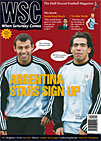 Some people are never happy – take Bayern Munich. Dominant at home but toothless abroad, the German champions have taken out their frustration on Owen Hargreaves, as Karsten Blaas reports
Some people are never happy – take Bayern Munich. Dominant at home but toothless abroad, the German champions have taken out their frustration on Owen Hargreaves, as Karsten Blaas reports
When Bayern Munich secure yet another Bundesliga title, mostly with two or three games to spare, the players gather in the centre circle after the final whistle to celebrate. They start jumping up and down and wave at the crowd. One of them, usually Hasan Salihamidzic or Bastian Schweinsteiger, produces a large glass of wheat beer, a Bavarian speciality, and pours it over somebody else’s head. Oliver Kahn clenches his fists and grits his teeth at the supporters and throws his gloves into the crowd. After about 15 minutes, the players gradually disappear into the dressing room. It’s a dull procedure, probably even for those who feel affiliated to the club.